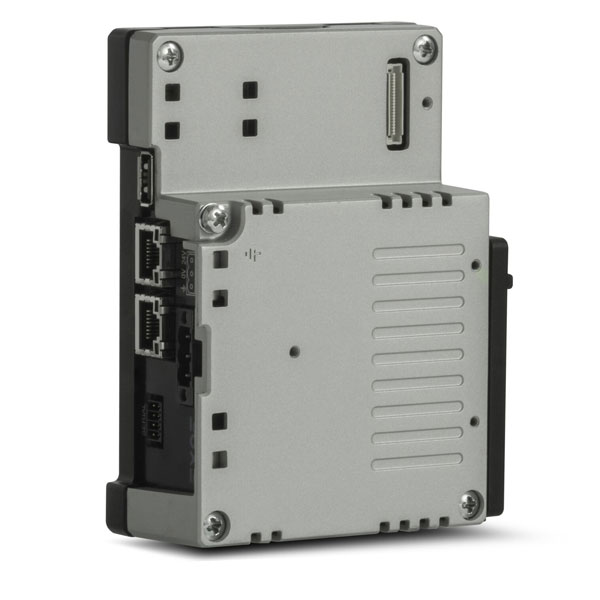The eXware represents a prudent first step into the implementation of IIoT and Industry 4.0 compatibility. Acting as the central element in IIoT landscape the eXware can communicate between automation devices, cloud, fog and
applications.
This central role offers companies the chance to start at a uncomplicated level in IIoT and yet allows enormous future expansion into more complex aspects of Industry 4.0 as the workforce gains knowledge of this form of digital thread process and control.
For maximum security the physical separation of the OT and IT networks with two ethernet ports has been provided and this avoids simultaneous attacks.
Secure HTTPS/TLS encrypted data transmissions with signed and packet transfer ensures against data theft and eavesdropping.
Seamless integration is achieved with the vast library of protocols that is common with JMobile software. Existing installations are easily employed and upgraded when necessary and very little programming skill is needed given the brilliant User Interface of JMobile.
Through use as a gateway, a powerful HMI, a PLC with CODESYS V3 or a secure router, the eXware facilitates data intensive and complex IIoT applications to be enabled.

- Plug and Forget integration into existing infrastructure
- Device data flow easily configured
- JMobile protocols and gateway functions
- JM4web HTML5 interface for web HMI
- CODESYS V3: supports network stacks and local I/O expandability
- Direct OPC UA communications
- JMcloud secure remote connectivity
- Plug-in module for system expansion
- 2 Ethernet ports for physical separation of the OT and IT networks
- Rugged and Beautiful all metal design
- Wide operating temperature range
- System settings by web browser
- Trusted and secure Linux-based operating system
- Secure HTTPS/TLS encrypted data transmissions
- Mobile Communication via PLCM09 2G/3G modem*
- Support for Geo-Localization*
- IoT data distribution via MQTT*
| Functions | |
|---|---|
| Role/Application | Gateway, HMI, PLC, secure router – all data intensive IIoT applications |
| OT Networks | All Major Protocols: PROFITNET, EtherNet/IP, EtherCAT, POWERLINK, Modbus, DNP3, BACnet, etc |
| Data Communication | OPC UA standard (pub/sub over TSN*) |
| Cloud Connectivity | Node-RED*, Bluemix*, Azure*, AWS*, Docker* |
| Operating System | Linux |
| Security | HTTPS, TLS |
| System Resources | |
|---|---|
| CPU | ARM Cortex-A8 1 GHz |
| Operating System | Linux RT |
| Flash | 4 GB |
| RAM | 512 MB |
| Real Time Clock, RTC Back-up, Buzzer | Yes |
| Interface | |
|---|---|
| Ethernet port | 2 (port 0 – 10/100, port 1 – 10/100) |
| USB port | 1 (Host v. 2.0, max. 500 mA) |
| Serial port | 1 (RS-232, RS-485, RS-422, software configurable) Max 2 serial ports using plug-in modules. |
| SD card | Yes |
| Expansion | 1 slot for plug in modules |
| Ratings | |
|---|---|
| Power supply | 24 Vdc ( 10 to 32 Vdc ) |
| Current Consumption | 0.5 A max. at 24 Vdc |
| Input Protection | Electronic |
| Battery | Yes |
| Environment Conditions | |
|---|---|
| Operating Temp | -20° to +60 °C (vertical installation) Plug-in modules and USB devices may limit max temperature to +50 °C |
| Storage Temp | -20°C to +70°C |
| Operating / Storage Humidity | 5-85% RH, non condensing |
| Protection Class | IP20 |
| Dimensions and Weights | |
|---|---|
| Faceplate LxH | 45×134 mm (1.77×5.27“) |
| Depth | 102 mm (4.01”) |
| Weight | 0.6 Kg |
| Mounting | TS35 DIN Rail |
| Approvals | |
|---|---|
| CE | Emission EN 61000-6-4 Immunity EN 61000-6-2 for installation in industrial environments |